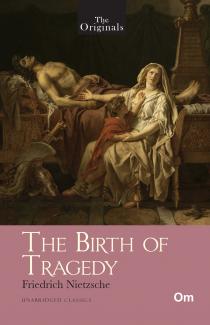The Originals The Birth of Tragedy
Friedrich Wilhelm Nietzsche (1844–1900) was a notable German philosopher who remains one of the most influential modern thinkers. He is renowned for writing on the concept of the “Superman”, the end of religion in a modern society as well as his exploration of the concepts of good and evil. Some of his major philosophical works are Thus Spake Zarathustra (1883), The Antichrist (1885) and Twilight of the Idols (1889). Many major thinkers of the 20th century such as Jean-Paul Sartre, Sigmund Freud and Albert Camus, among others, were deeply influenced by Nietzsche’s ideas. After his death, the misappropriation of his works by the Nazi Party in the 30s and 40s of the last century to further their fascist activities resulted in a negative reputation for generations whereas Nietzsche himself was steadfastly against anti-Semitism. Nietzsche died on 25 August 1900, aged 55. ... Read more Read less
In this sense the Dionysian man resembles Hamlet: both have once looked truly into the essence of things, they have gained knowledge, and nausea inhibits action. Celebrated German philosopher Friedrich Nietzsche’s The Birth ofTragedy from the Spirit of Music was first published in 1872.The book was reissued in 1886 as The Birth of Tragedy, Or: Hellenism and Pessimism, prefaced by an essay titled An Attempt at Self-Criticism. In this seminal work of dramatic theory, which is divided into 25 chapters, Nietzsche explores the history of the tragic form as well as the nature of Greek tragedy and its development. He holds up Athenian tragedy as an art form that transcends the meaninglessness, nihilism, and disorder of the chaotic world. By watching tragedies and celebrating them, Greek audiences experienced fear and suffering and confronted life head-on.Tragedies helped them to find the deeper meaning of human existence. Nietzsche also shines a light on the differences between the Dionysian and the Apollonian in The Birth of Tragedy, emphasising that these two elements are constantly at war for control of human lives. ... Read more Read less











